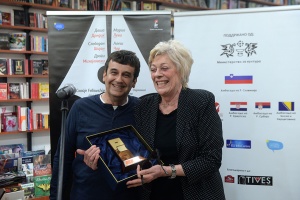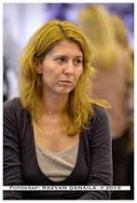 EUROPEAN UNION PRIZE FOR LITERATURE – promoting writing from around the Union and beyond….
EUROPEAN UNION PRIZE FOR LITERATURE – promoting writing from around the Union and beyond….
The EU Prize for Literature, founded in 2009 and financed by the Culture Programme of the European Union, is conceived as a means of promoting the circulation of literature within Europe, going beyond national and linguistic borders and bringing our wealthy and diverse reserves of literature closer to readers all across the Union. By its rotational participation system and the selection of one author from each country, the Culture Programme of the European Union aspires to bring readers from all over the EU closer to works which might otherwise have been confined inside national borders. Thus, artistic and creative output is broadcast all over the European and international community, and the flow of intercultural dialogue finds new channels.
In charge of coordinating the initiative is the Condortium, which is composed by members of the European Booksellers Federation (EBF), the European Writers’ Council (EWC) and the Federation of European Publishers (FEP). The Consortium is responsible for the setting up of the national juries and the practical organisation of the award ceremony. To date, Istros Books has published several works by authors that have been selected by their national juries and awarded the EU Prize for Literature. We’ve listed the, here so you can check them out:
Ognjen Spahić, who won the prize this year for his “Puna glava radosti”, was born in 1977 in Podgorica, Montenegro. He claims that he spent the 1990s reading whole libraries, having been denied a passport because he refuse to serve with the Yugoslavian Army. Previous works of his include: two collections of short stories: Sve to (All That, 2001) and Zimska potraga (Winter Search, 2007). His novel, Hansen’s Children won him the 2005 Meša Selimović Prize for the best new novel from Croatia, Serbia, Montenegro and Bosnia-Herzegovina and the 2011 Ovid Festival Prize. Spahic’s works have been translated to Slovenian, Romanian, Hungarian, Macedonian, Czech, Greek, Turkish, Romanian, Bulgarian, English, Albanian and German. His short story “Raymond is No Longer with Us—Carver is Dead” was included in the anthology Best European Fiction 2011 published by Dalkey Archive Press in the USA. Spahić lives in Podgorica.
Çiler İlhan, from Turkey, was awarded the 2011 EU Prize for Literature for collection of stories Sürgün (Exile), which will be in bookstores by April ‘15. An active writer since her youth, she has collected the Yaşar Nabi award in 1993 for one of her short stories. She regularly publishes stories, essays, book reviews, travel pieces and translations in Turkish newspapers and magazines.
Andrej Nikolaidis, who was awarded the 2011 EU Prize for Literature for The Son, was born in 1974 to a Greek-Montenegrin family, in Sarajevo. A controversial, politically outspoken figure in his country, Nikolaidis has written for regional independent and liberal media, as well as for cultural magazines. He is widely considered one of the leading intellectuals of the younger generation, and is known for his anti-war activism and for his defense of freedom of speech and the rights of minorities.
Jelena Lengold is a Serbian poet, novelist and journalist. She won the 2011 EU Prize for Literature for her short story collection Fairground Magician. Aside from that she has published five books of poetry, four volumes of short stories, and one novel. She he worked as a project coordinator in the Conflict Management programme of Nansenskolen Humanistic Academy in Lillehammer, Norway, where she touched on themes such as interethnic tolerance, discrimination, negotiations, human rights and peaceful conflict resolution. She lives in Belgrade.
Gabriela Babnik is a Slovenian writer and translator. Her travels to Africa, especially Burkina Faso, have inspired much of her work. She has an MBA in Contemporary Nigerian Novel and has translated Half of a Yellow Sun, a novel by Chimamanda Ngozi Adichie’s to Slovene. Her third novel, Dry Season, for which she was awarded the EU Prize for Literature, will be published by Istros Books in October 2015.



![Death In The Museum of Modern Art [NEW]3](https://istrosbooks.files.wordpress.com/2014/07/death-in-the-museum-of-modern-art-new3.jpg?w=98&h=150)






